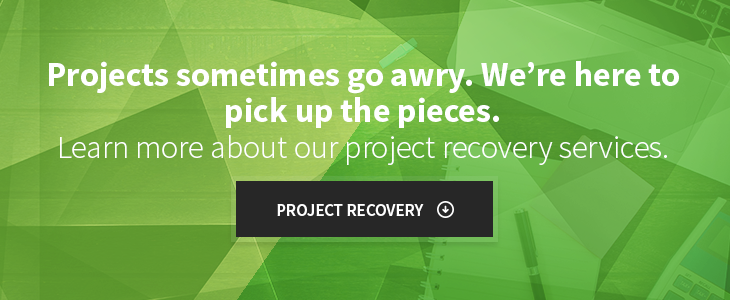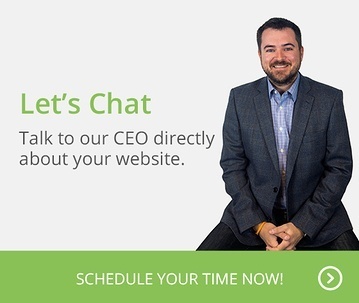If you read our last couple of blog posts, you should have a better understanding of how to avoid the implosion of your digital production project. In those posts, I focused on two places where you can be diligent to prevent total project failure: during the sales cycle and during development.
But what if it’s already too late? What if you’ve already had a project fail, and now you’re picking up the pieces? Or what if your agency relationship has soured and you don’t know where to turn?
First of all, don’t stress out too much—this has happened to many people in the past. The first thing you have to do is accept that the project (or relationship) didn’t go as you would have hoped. Now you have to focus on triaging your situation and moving forward.
Once you have gathered yourself, you can start the process of recovering from the failure. With that in mind, we’ve assembled a list of steps you should take as you reinitiate your project with a new partner.
Step 1: Analyze How You Got Here
This is the hardest step simply because it will require you to step outside your own perspective and thoughtfully review the history of your project. Yep, that means being honest with yourself and determining if there were problems or lack of thoroughness on your side in procuring or managing the project.
I’m definitely not saying that most problems are caused by the client—I’m simply saying that you should look back to see how your choices and process in selecting the vendor and subsequently during the project could have led to a breakdown.
Even if the fault for the project failing falls 100% on the agency, was there any way you could have predicted it? Were there any indications during the project or before that, if properly acted on, could have saved you time or money? If this was a long-term agency relationship, what frustrations grew into irreconcilable differences?
Looking back at our previous two posts, do you believe the breakdown occurred due to flaws in the sales cycle? Was there a lack of understanding about the project from the vendor’s point of view? Or was there a lack of clarity with regards to the deliverables on your side, as the client?
Until you can have an honest review, you will be more likely to make the same mistakes again. So take your time to figure out where the breakdown occurred and how you can prevent making those same mistakes again. After all, if you don’t treat this as a learning experience, you might as well not try again.
Step 2: Take an Inventory
Before talking to a new agency, find out exactly what you have and where your project currently stands. This is a good time to compare original write-ups and specifications and compare them to where you are today.
This is also a great time to get your hands on as much of the creative and production assets as possible. If a project breaks down, it is likely your agency will not be willing to hand over the work product. Most of the time this happens because if the project fails, the agency will not be getting paid what they think they deserve, therefore they will hold back on any deliverables.
Work your hardest to gain access to those materials to prevent a complete loss of the work effort to date. It may require you paying some of the remaining funds, but getting nothing after paying something is not an alternative that will help you move forward.
Step 3: Understand the Digital Agency Industry
Since this is now your second chance to get things right, it’s important you understand how the digital agency industry functions and how agencies are managed to get a sense of what the right relationship is for you.
We covered the different types of agencies a few weeks ago, when we discussed minimizing your risk when entering into an agency relationship. Take your time to review that post and try to determine what kind of agency you were working with.
What went well with your arrangement, and what went awry? What agency is the best fit for you given your risk profile?
If this post sheds some light on the types of agencies that exist and enhances your awareness of the options, try to predict what type of agency is best for you. Do you really want to take on another risky contract or relationship? Or do you want to try a different agency structure to give your project another shot?
Step 4: Prepare Better
Now that you understand where things failed and what your new options are, now is the time to prepare properly for your next procurement cycle. This should mean that you are now aware of how important it is to properly specify and architect your project.
Ensure that your next partner is willing to work with you to develop a specification, preferably during a paid discovery. You’ll never get a thorough or valuable specification from any agency for free—no agency will deliver the most valuable part of a project without some level of monetary consideration.
We’ve reviewed the discovery concept so often on this blog that I won’t again explain the process and value of a discovery findings report and specification. This is your second time attempting your project, so make sure that this step is a requirement for any new vendor.
If you’re not even considering using a prior work product or if you’re simply rebuilding your app or website, prepare a wishlist of items or concerns based on your prior experiences. Review your largest complaints or issues with your previous partner—you don’t necessarily want to just bash them to your new prospective partner, but rather carefully skirt around the topics and see how they respond objectively.
Take all of your hard-learned knowledge and use that as insight so you are properly prepared for the next step of finding a new agency.
Step 5: Take Two: Better Procurement
With knowledge of the type of agency you are looking for, you can begin to find potential partners, but this time with better preparation and understanding of the common pitfalls that may lead to a repeat failed performance.
Set up some introductory calls and begin listening to their approach to your project. Remember that a big part of an agency-client relationship is a personal fit, in addition to technical capabilities or relative experience. Focus on finding a team you trust and that will give you the time and resources you expect to receive.
Finally, focus on their approach given your situation—either a project that can be built upon or, the worst-case scenario, a complete rebuild. Every agency will take a different approach, and this is where you will get a better sense of whether your disaster can be recovered or if a rebuild is ultimately necessary.
This point makes for a good segue into our final step…
Step 6: Triage or Rebuild?
As I said before, there are two scenarios when leaving your previous agency. Either your project has failed completely and never even saw the light of day, or it was deployed, maintained, and some other situation caused the agency relationship to erode.
The question is—what now?
Every agency is different in how they approach these situations. Some agencies will never touch the work of other developers. It is inherently risky for agencies to do so. Unless built on a standardized platform, it’s nearly impossible to properly estimate or quote work to be done when the platform isn’t stable or was built to some lower level of quality. Other agencies will take any work they can get, and figure it out as they go.
Your job is to determine your best option moving forward, both in the short and long term. In the short term, you have to work to decouple yourself from your old agency, gain control over all assets, and host/manage your ecosystem without their assistance. Any agency you choose to work with should be able to conduct this process with you regardless of what the long-term strategy is.
With regards to long term, you need to have an understanding with your new agency before they onboard you as to what your best pathway forward will be. You don’t want to triage with an agency, work to get your website or application working again, only to later not be on the same page about how the next iteration will work.
Ultimately, the answer as to whether to triage and modify or completely rebuild will come down to a variety of factors ranging from technology to budget. There is no one right answer. But you want to make sure your new agency has multiple options for you. Don’t get locked into another bad relationship.
The Last Step: Managing Expectations
I wish there was some secret formula to having the best agency-client relationship possible. Frankly, there isn’t. Much like interpersonal relationships, it’s important to have clearly defined expectations, as opposed to implied expectations.
Furthermore, it’s important to have a clear channel of honest communication. Agencies can’t read minds, and neither can clients understand all the techno-babble we seem to always throw out there. I always train my employees to ask questions, such as “how are we doing?” or “does that answer your question?” These are easy and honest ways to communicate.
Likewise, as a client, you should do the same. You are paying us not only for our expertise, but also for our knowledge, which a good agency is always willing to transfer to you. So ask questions and challenge our opinions. We like the communication!
Finally, if planning an ongoing agency relationship, define the processes you’ll be using on a regular basis. Plan for regular check-up calls and meetings. Have quarterly summits where you spend quality time plotting and planning for the future. And have systems in place to track tasks and requests as they arise.
Ongoing relationships are about organization and collaboration—make sure you set yourself up for success by having plans and procedures in place from day one.
Conclusion
It’s impossible to predict the future. Much like dating and finding the right mechanic, there is always going to be a certain amount of risk and uncertainty involved in establishing a relationship with an agency. This is doubly true if you’ve been burned before and had to watch your project blow up, regardless of whose fault it was.
That’s all the more reason to tread carefully now and be diligent when seeking to recover and move forward. Hopefully, these steps—and the lessons you learned the hard way from your previous experience—will give you some perspective on what you should be looking out for and empower you to make better, smarter decisions in the future.



